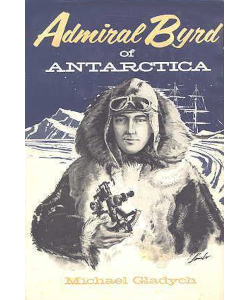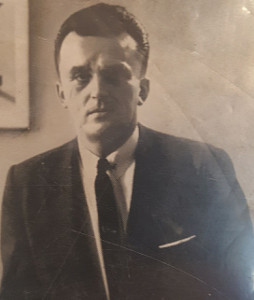Admiral Byrd of Antarctica

Author:
Michael Gladych
Cover Artist:
Don Lambo
Publication:
1960 by Julian Messner, Inc.
Genre:
Biography, Military, Non-fiction
Series:
Messner Shelf of Biographies (World History)
Pages:
192
Current state:
This book has been evaluated and information added. It has been read but content considerations may not be complete.
Book Guide
Search for this book used on:
At a time when aviation was mainly a sport for daredevils, Richard Byrd was flying and exploring the wilderness of the North Pole. Later he made five expeditions to the Antarctic, setting up permanent bases for scientific study.
Byrd's adventures began at the age of thirteen when he left his home in Virginia and traveled alone to the Philippines. At fourteen he had already circumnavigated the globe. Longing for further adventure, Byrd made careful plans for the future. He wanted to be the first to explore the North and South Poles, and since this would require seamanship, he entered Annapolis. Meanwhile he suffered a series of disappointments—Peary discovered the North Pole, Amundsen reached the South Pole. Serious football accidents made Byrd unfit for active duty and doomed him to desk work. He longed to be an explorer, but with a fractured leg he could not even walk properly. But he thought, "I could fly..."
Flying in those days of World War I was often suicidal, but after only six hours in the air Byrd was soloing. He planned the first transatlantic flight of history and was ready for take-off when a message from Washington killed his dream. Ready to navigate the first dirigible flight from England to the United States, he missed his train connections and escaped death when the dirigible crashed.
Everything seemed to conspire against him until he piloted the first airmail flight across the Atlantic. Later he beat Amundsen's dirigible in a race to the North Pole. Then he began his conquest of the Antarctic, opening five million miles of hostile wilderness. On his second expedition he spent seven harrowing months alone at an advanced base, out of touch with anyone and close to death when he was poisoned by carbon monoxide fumes.
Awarded the Medal of Freedom in 1957, the Secretary of Defense said among other things, "By virtue of his unparalleled experience, skill, daring and imagination, he has made a unique contribution to the Antarctic expeditions of the past several years, the development of permanent Antarctic legislation and international scientific understanding and good will ... and has personally laid the groundwork for the present large-scale Antarctic effort of the United States."
From the dust jacket
To view an example page please sign in.
Content Guide
Please sign in to access all of the topics associated with this book and view other books with the same topics.
Please sign in to access the locations this book takes place in and view other books in the same location.
Please sign in to access the time periods this book takes place in and view other books in the same time period.
For information about the lead characters please sign in.
Reviews

Admiral Byrd of Antartica
Reviewed by Sherry Early
Another Messner biography, published in 1960, Admiral Byrd of Antarctica is a solid, decent read, but not as enthralling or inspiring as other Messner biographies I’ve read. Gladych characterizes Byrd, who explored both the Arctic and the Antarctic, as resourceful, persistent, brave and somewhat driven by a desire to do something important and noteworthy.
Find This Book
Search for this book used on:


